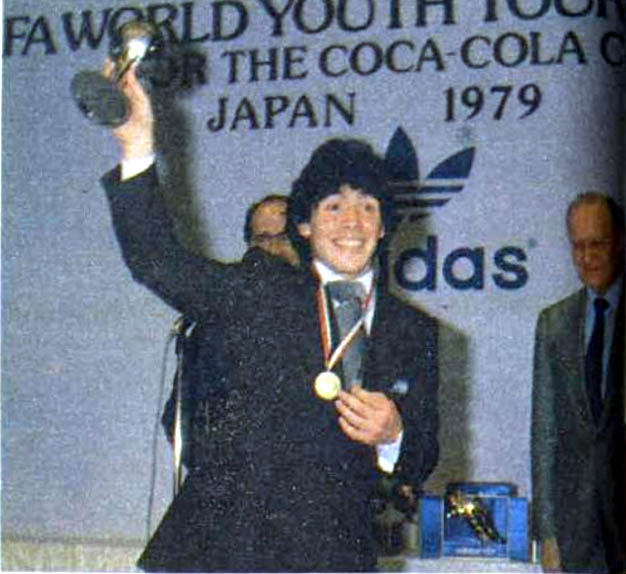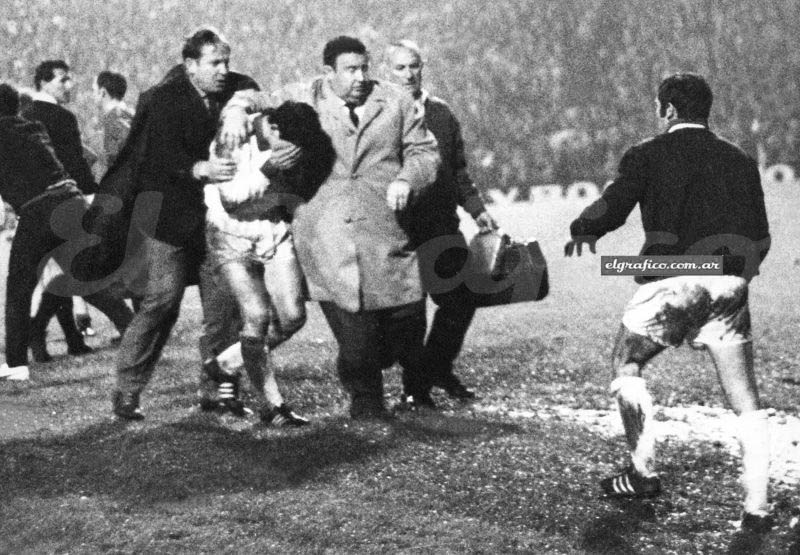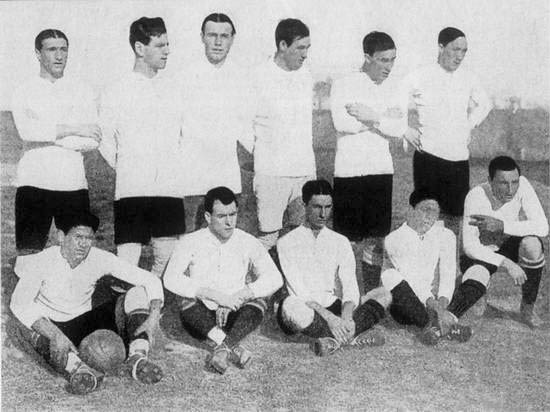|
Rogelio Delgado
Rogelio Wilfrido Delgado Casco (born 12 October 1959) is a retired Association football, football Defender (association football), central defender from Paraguay. Club career At the club level, Delgado played for Olimpia Asunción, where he won the Copa Libertadores and Intercontinental Cup (football), Intercontinental Cup in 1979, and six Paraguayan Primera División, Paraguayan league titles. He also played for Club Atlético Independiente, Independiente of Argentina, where he won the 1988–89 in Argentine football, 1988–1989 league championship, and for Universidad de Chile (football club), Universidad de Chile, where he won the 1994 Chilean league championship. After retiring as a player, Delgado took up coaching. He came out of retirement to play one game for Colo-Colo in the 1995 edition of the Supercopa Sudamericana, Supercopa. International career Delgado was a member of the Paraguayan squad at the 1979 FIFA World Youth Championship. He made his full international ... [...More Info...] [...Related Items...] OR: [Wikipedia] [Google] [Baidu] |
Asunción
Asunción (, , , Guarani: Paraguay) is the capital and the largest city of Paraguay. The city stands on the eastern bank of the Paraguay River, almost at the confluence of this river with the Pilcomayo River. The Paraguay River and the Bay of Asunción in the northwest separate the city from the Occidental Region of Paraguay and from Argentina in the south part of the city. The rest of the city is surrounded by the Central Department. Asunción is one of the oldest cities in South America and the longest continually inhabited area in the Río de la Plata Basin; for this reason it is known as "the Mother of Cities". From Asunción, Spanish colonial expeditions departed to found other cities, including the second foundation of Buenos Aires, that of other important cities such as Villarrica, Corrientes, Santa Fe, Córdoba, Santa Cruz de la Sierra and 65 more. Administratively, the city forms an autonomous capital district, not a part of any department. The metropolitan a ... [...More Info...] [...Related Items...] OR: [Wikipedia] [Google] [Baidu] |
1979 FIFA World Youth Championship
The 1979 FIFA World Youth Championship, the second staging of the FIFA World Youth Championship, was held in Japan from 26 August to 7 September 1979. It was the first FIFA tournament played in Asia. The tournament took place in four cities — Kobe, Omiya, Tokyo and Yokohama — where a total of 32 matches were played, four more than in the previous edition due to the addition of a quarterfinal round in the knockout stage. Argentina won the trophy after beating holders Soviet Union 3–1, in a final held at Tokyo's National Stadium. Argentina fielded an attack-minded high-scoring team, averaging 3.33 goals per game. They were led by the powerful duo of Diego Maradona and Ramón Díaz, who were the tournament's best player and top scorer respectively. Between the two of them, they scored 14 of Argentina's 20 goals (70%). Qualification :1.Teams that made their debut. Squads For a list of all squads that played in the final tournament, see ''1979 FIFA World Youth Champi ... [...More Info...] [...Related Items...] OR: [Wikipedia] [Google] [Baidu] |
Argentine Primera
Argentines (mistakenly translated Argentineans in the past; in Spanish ( masculine) or ( feminine)) are people identified with the country of Argentina. This connection may be residential, legal, historical or cultural. For most Argentines, several (or all) of these connections exist and are collectively the source of their being ''Argentine''. Argentina is a multiethnic and multilingual society, home to people of various ethnic, religious, and national origins, with the majority of the population made up of Old World immigrants and their descendants. As a result, Argentines do not equate their nationality with ethnicity, but with citizenship and allegiance to Argentina. Aside from the indigenous population, nearly all Argentines or their ancestors immigrated within the past five centuries. Among countries in the world that have received the most immigrants in modern history, Argentina, with 6.6 million, ranks second to the United States (27 million), and ahead of other im ... [...More Info...] [...Related Items...] OR: [Wikipedia] [Google] [Baidu] |
Copa Interamericana
The Copa Interamericana ( en, Interamerican Cup) was an annual club football competition contested between a representative from North America (CONCACAF) and South America ( CONMEBOL). Established in 1969, it was discontinued in 1998 after CONCACAF clubs, particularly those from Mexico, began participating in CONMEBOL competitions. The competition was intended to be contested between the winners of the North American CONCACAF Champions Cup and the South American Copa Libertadores tournaments, although the participants varied at times. The competition was usually contested over a two legged tie, with a playoff or penalty kicks if necessary. However, it was common for several consecutive editions to go unheld. Of the 18 competitions played out, four of them were contested over several matches in just one venue. Two others were held in a single match. Another two editions had participants that didn't outright qualify to dispute the competition. Most of the editions were held one, ... [...More Info...] [...Related Items...] OR: [Wikipedia] [Google] [Baidu] |
1979 Intercontinental Cup
The 1979 Intercontinental Cup was an association football final played on a two-legged system. It was the last time in the history of the tournament that this format was used before Toyota became the main sponsor in 1980 and a single-game final was held each year in Japan. The final was played between Olimpia Asunción of Paraguay (winners of the 1979 Copa Libertadores) and Malmö FF of Sweden (runners-up of the 1978–79 European Cup), with Olimpia emerging as the champion after a 3–1 aggregate score win. Malmö FF took its place as the runners-up of the European competition since the European champions Nottingham Forest declined to play the final. __TOC__ Match details First leg , valign="top" width="50%", ---- Second leg , valign="top" width="50%", See also * 1979 Copa Libertadores * 1978–79 European Cup * Malmö FF in European football References External links1979 Intercontinental Cupat RSSSF by Osvaldo José Gorgazzi {{DEFAULTSORT:Inter ... [...More Info...] [...Related Items...] OR: [Wikipedia] [Google] [Baidu] |
Copa Intercontinental
The European/South American Cup, more commonly known as the Intercontinental Cup and from 1980 to 2004 as the Toyota European/South American Cup (abbreviated as Toyota Cup) for sponsorship reasons, was an international football competition endorsed by UEFA (Europe) and CONMEBOL (South America), contested between representative clubs from these confederations (representatives of most developed continents in the football world), usually the winners of the UEFA Champions League and the South American Copa Libertadores. It ran from 1960 to 2004, when it was succeeded by the FIFA Club World Championship, although they both ran concurrently in 2000. From its formation in 1960 to 1979, the competition was as a two-legged tie, with a playoff if necessary until 1968, and penalty kicks later. During the 1970s, European participation in the Intercontinental Cup became a running question due to controversial events in the 1969 match, and some European Cup-winning teams withdrew.Risolo, D ... [...More Info...] [...Related Items...] OR: [Wikipedia] [Google] [Baidu] |
1979 Copa Libertadores
The 1979 Copa Libertadores represented the 20th edition of the tournament, which saw Olimpia of Paraguay win the title for the first time, the first time a team from a country outside Uruguay, Argentina or Brazil won the tournament. This allowed the Paraguayan side to play the Intercontinental Cup against Malmö FF of Sweden, in which the South American side won. Qualified teams * Argentina **Boca Juniors (1978 Libertadores Champion) **Independiente (Champion of Campeonato Nacional Argentino 1978) **Quilmes (Champion of Campeonato Metropolitano Argentino 1978) * Bolivia **Bolívar (Champion of Campeonato Boliviano 1978) **Jorge Wilsterman (Runners-up of Campeonato Boliviano 1978) * Brazil **Guarani (Champion of Campeonato Brasileiro 1978) **Palmeiras (Runners-up of Campeonato Brasileiro 1978) * Chile **Palestino (Champion of Campeonato Chileno 1978) **O’Higgins (Winner Liga Pre-Libertadores 1978) * Colombia **Millonarios (Champion of 1978 Campeonato Profesional) **Deportiv ... [...More Info...] [...Related Items...] OR: [Wikipedia] [Google] [Baidu] |
Copa América 1989
Copa or COPA may refer to: COPA COPA may refer to: * Computer Operator Programming Assistant. trade of ITI * Child Online Protection Act, a former U.S. law to protect minors from certain material on the internet * Canadian Owners and Pilots Association * Cirrus Owners and Pilots Association * Parliamentary Conference of the Americas * COPA (gene), a human gene that encodes the coatomer subunit alpha protein * Controlling Profitability Analysis, Profitability Analysis (SAP) *COPA-COGECA, a union of European farmers Copa Copa may refer to: * Copa Heizung GmbH, COPA branded hydronic steel panel and bathroom radiator supplier based in Germany * Copa Airlines, an international airline based in Panama * Copa America, the main association football competition of the South American men's national football teams * ''Copa'' (spider), a genus of spiders in the family Corinnidae * Copacabana (nightclub), a nightclub in New York City * Copa Room, now-defunct Las Vegas nightclub at The Sands ... [...More Info...] [...Related Items...] OR: [Wikipedia] [Google] [Baidu] |
Copa América
The Copa América ( en, America Cup) or CONMEBOL Copa América, known until 1975 as the South American Football Championship (''Campeonato Sudamericano de Fútbol'' in Spanish and ''Campeonato Sul-Americano de Futebol'' in Portuguese), is the top men's football tournament contested among national teams from South America. It is the oldest still-running continental football competition, as well as the third most watched in the world. The competition determines the champions of South America. Since the 1990s, teams from North America and Asia have also been invited to compete. Since 1993, the tournament has generally featured 12 teams—all 10 CONMEBOL teams and two additional teams from other confederations. Mexico participated in every tournament between 1993 and 2016, with one additional team drawn from CONCACAF, except for 1999, when AFC team Japan filled out the 12-team roster, and 2019, which featured Japan and Qatar. The 2016 version of the event, Copa América Cente ... [...More Info...] [...Related Items...] OR: [Wikipedia] [Google] [Baidu] |
Mexico
Mexico ( Spanish: México), officially the United Mexican States, is a country in the southern portion of North America. It is bordered to the north by the United States; to the south and west by the Pacific Ocean; to the southeast by Guatemala, Belize, and the Caribbean Sea; and to the east by the Gulf of Mexico. Mexico covers ,Mexico '' The World Factbook''. . making it the world's 13th-largest country by area; with approximately 12 ... [...More Info...] [...Related Items...] OR: [Wikipedia] [Google] [Baidu] |



